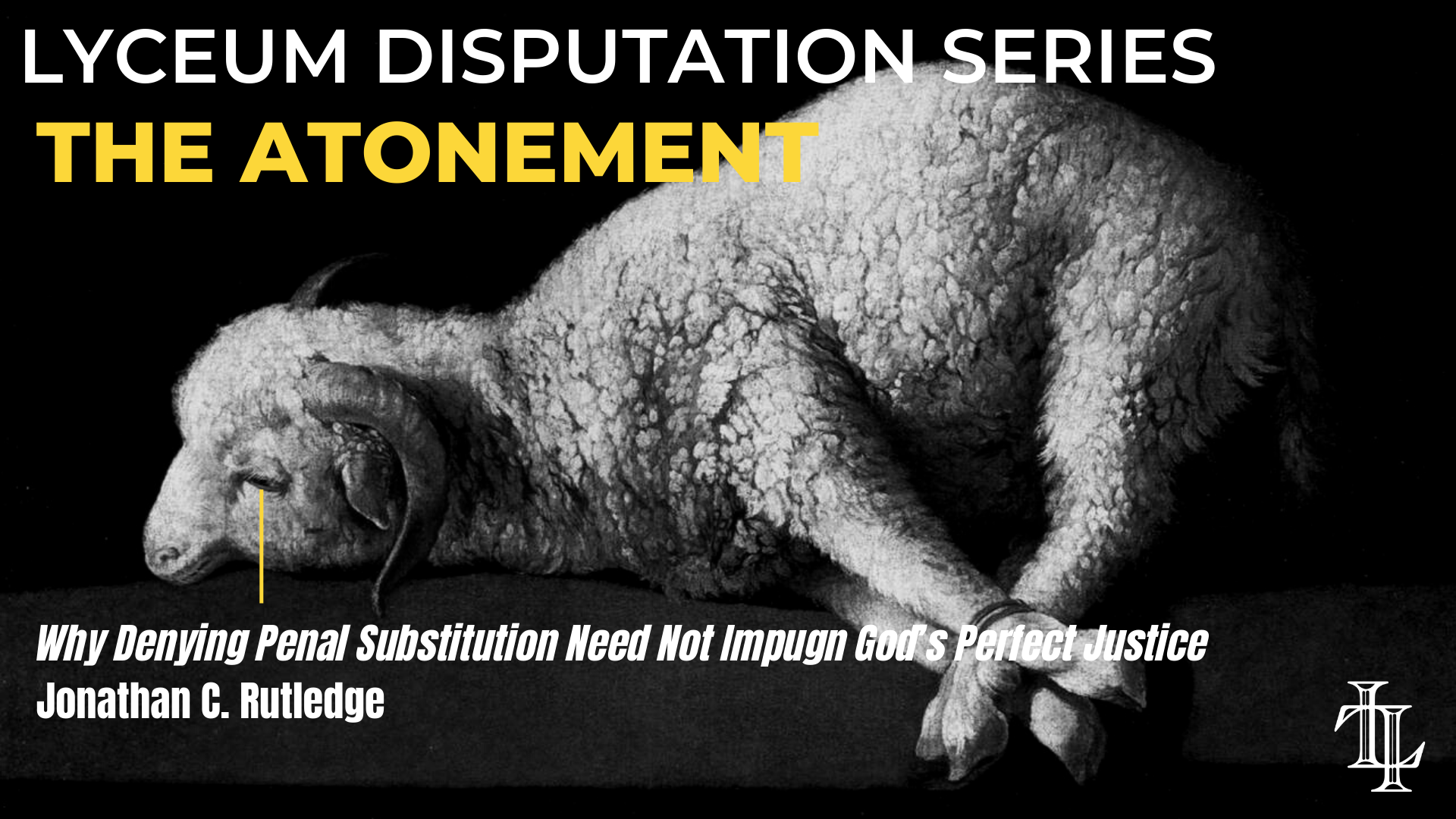Editor’s Note: This is part 3 in our Lyceum Disputation series considering the necessity of Penal Substitutionary Atonement as described in this 2017 SBC resolution. Stay tuned for further installments. As with all our work, the London Lyceum publishes a range of viewpoints to encourage thinking.
In the summer of 2017, a Southern Baptist Convention resolution was passed concerning the vital importance of the doctrine of penal substitutionary atonement. Well, calling it “vitally important” is maybe a bit understated compared to the actual language of the resolution. According to that document, not only is penal substitution vitally important, but it is “the burning core of the Gospel message and the only hope of a fallen race.” In other words, the writers of this resolution clearly think giving up the doctrine of penal substitution is equivalent to giving up the Gospel of Christ.
Full disclosure: I am an analytic philosopher and theologian who, while I grew up in an SBC church, has chosen to leave that tradition. Even so, I come to this discussion from a place of deep gratitude for the churches and leaders from whom I learned much in the earlier years of my Christian walk, and I recognize that within any robust tradition a variety of voices and viewpoints will characterize the members of that tradition. In other words, while I take the resolution that is our topic here to be widely affirmed by members of the SBC, it should be equally clear that many members of the SBC might balk at various aspects of the resolution. What I propose to do, then, is to focus on aspects of that resolution and ask questions that might lead us to think simultaneously critically and charitably about it, and in so doing, I encourage others who find this resolution curious (or ‘cheeky’ as my Scottish friends would say) to resist any temptation to paint the SBC, and its members, with too broad a brush. The argument and claims of the resolution itself are what we should focus on. But now, back to penal substitution.
First, let’s make something clear. Despite its name, the topic of the 2017 SBC Resolution on Penal Substitution is not the doctrine of penal substitution. Why, you ask? Well, the short answer is this: there’s no such thing as the doctrine of penal substitution. For a longer answer: penal substitution refers to a family of views of atonement that can be distinguished from one another on the basis of such things as (i) the relevant definition of ‘punishment’, (ii) the underlying nature of justice, (iii) views on the sense in which Christ is a substitute for us individually or perhaps as a corporate agent of some sort, (iv) the rationale for the punishment Christ bears on our behalf, (v) the particular punishments—first, of humanity and second, of Jesus—involved (e.g., death, death plus eternal suffering, separation from God), etc. In fact, there are so many variables to consider when defining a view of penal substitution that if it really is “the burning core of the Gospel”, we would do well to figure out which version of penal substitution fits the bill.[1]
Unfortunately, the resolution does not provide sufficient detail concerning the particular form of penal substitution envisaged, so it is hard to offer specific reflections about the view. What we do get, however, is a passing comment concerning what is thought to be wrong (or theologically dangerous) about those who would deny penal substitution: namely, that doing so impugns God’s perfect retributive justice. So, in what follows, I propose that we turn our attention to this small portion of the resolution in hopes that we can uncover whether or not this sort of claim can be sustained on critical reflection.
Let’s begin, then, with the resolution itself:
WHEREAS, The denial of penal substitutionary atonement in effect denies the holy and loving God the exercise of His justice, the overflow of which in a sinful world is the outpouring of His just retributive wrath; and
WHEREAS, The denial of penal substitutionary atonement thus displays in effect the denial of the perfect character of the one true God[2]
Reread those lines carefully. In them, we are told that denying penal substitution “denies the holy and loving God the exercise of His justice, the overflow of which in a sinful world is the outpouring of His just retributive wrath.” That word ‘retributive’ is significant because it signals a view on the nature of fundamental justice: namely, that the deserved punishment of a wrongdoer is itself an intrinsic good.[3] What is an intrinsic good? Well, it is something with value in itself, like courage or love. We don’t explain why courage and love are valuable by talking about other things (for example, whatever courage or love might get us: social status or love returned). They—i.e., courage and love—are valuable in themselves! And similarly, retributivists claim that punishing wrongdoers is valuable in the same way.
To get an idea of why the resolution’s condemnation of those who deny penal substitution (of a retributivist variety) is so emphatic, we are immediately told, in the following paragraph, that denying the doctrine of penal substitution amounts to a further “denial of the perfect character of the one true God.” Given that it is God’s justice that seems most immediately relevant to the question of God’s perfect character, the gestured-at argument seems to be something like this:
- Punishing wrongdoers is intrinsically good (Definition of Retributivism)
- If God is perfectly just, then God ensures the instantiation of all intrinsic goods
- If God is perfectly just, then God always punishes wrongdoers (from 1 & 2)
- God is perfectly just (premise)
- God punishes wrongdoers (from 3 & 4)
But this argument has not yet connected us with penal substitution more fully. Instead, it only leads us to the view that God punishes wrongdoers. To get to penal substitution, we need to claim that the punishment that would have been applied to humanity was instead directed at Christ as our substitute. Here is one way to get there[4]:
- If God punishes non-divine humans for their sin, then there cannot be reconciliation between God and humanity (premise)
- There can be reconciliation between God and humanity (premise)
- God does not punish non-divine humans for their sin (from 6 & 7)
- Either God punishes non-divine humans for their sin or God punishes an appropriate substitute (premise)
- God punishes an appropriate substitute (from 8 & 9)
Something like the combined force of these two arguments seems to be in play, then, to motivate the language of the resolution. And, in particular, premise 9 captures the idea that Jesus serves as an appropriate substitute for humanity; that is, one who bears our punishment in our place (instead of us).[5]
So, if denying penal substitution impugns God’s justice, as the writers of the resolution claim, one would expect the denial of premise 9 to lead to issues earlier in the argument, such as committing such a person to the further denial of premises involving God’s perfect justice (e.g., premise 4). Here’s how that reasoning might go:
Well, look. Clearly God didn’t punish non-divine humans for sin because doing so would remove humanity from the picture entirely, which is to give up on divine-human reconciliation. But the God of the Bible is committed to reconciliation (at least some of the time). So, premises 6-8 are undoubtedly true. In that case, there must be something wrong with the earlier argument. There might be problems with premise 2, but it seems plausible at first glance. And if I accept premise 2, the only reason for denying premise 3 would be due to a denial that punishing wrongdoers is intrinsically good. But I am committed to retributive justice since there’s no other way to read scripture. As a result, the only way to deny penal substitution consistently is to deny that God is perfectly just. Fair enough. I hereby deny the justice of God and insist on the abounding of divine grace in its place!
The above paragraph of reasoning is not meant to be good. In fact, there are problems with the reasoning all around. The difficulty, however, is that seeing how one might be led to think that denying penal substitution entails—that is, guarantees—that one denies God’s perfect justice requires us to fill in a monstrous gap. What is the necessary relation between justice and penal substitution that is required? We are not told, and the sheer mass of such logically live views makes closing the gap, at the very least, impractical.
A few comments, then, are in order for how someone might avoid the charge of denying God’s justice whenever they deny penal substitution. Here is one way: deny that divine justice is retributive. This amounts to a denial that implementing deserved punishment is an intrinsic good (premise 1), in which case, God’s failure to implement punishment would have no worrying implications regarding his justice. But perhaps that way out of the argument seems too easy, for surely no reasonable person could read scripture and think of justice as anything other than retributive.[6]
A second way to avoid impugning God’s justice by denying penal substitution would be this: deny that it is a requirement of justice to ensure that all intrinsic goods are actualized (premise 2). To see this, suppose that punishing wrongdoers is in fact intrinsically good. Even if that were correct (i.e., even if retributivism were true) there’s little reason to think that failing to bring about an intrinsic good results in a moral failure on the part of an agent. After all, consider what any good parent surely knows: it is sometimes good, all things considered, to refrain from punishing children from wrongdoing. Why? Because children can grow (in terms of character) out of gratitude for the refraining itself. In other words, having mercy on children on occasion can be as powerful a teacher as an eye-for-eye punishment. Indeed, often mercy is a better teacher than punishment. If this is right (and it is), then sometimes it is better to refrain from punishing one’s children for committing a wrong even if the punishment would be intrinsically good.[7] The fact that something is an intrinsic good simply does not entail that one must always seek after it or that it is highly good. I think the pleasure of eating a good cheesecake is intrinsically good, for instance, but my waistline forces me to reconsider the weight of that intrinsic good when deciding whether to take a bite. Other factors and consequences of eating it are clearly relevant.
What the above reflections should make clear is this: retributivist views on justice are not sufficient in themselves to get us to the conclusion that God must punish wrongdoers if God is just. The fact that, on that view, deserved punishment is an intrinsic good is insufficient to guarantee that God would always pursue that good. Instead, we need a stronger commitment, something that requires a just God to act in certain ways. In other words, we need a deontological form of retributivism; something that captures a putatively inviolable rule of morality. Here is such a thesis: it is never morally permissible to refrain from punishing wrongdoers.
Suppose someone were to trot this principle out in conversation. My initial reaction to it is straightforward: Really? What if I know that the appropriate punishment of the wrongdoer will only result in the further inculcation of that person’s vices and the refraining of punishment would lead them down a path of repentance? Psychologically-speaking, there’s no reason to think this is impossible, and anyone can introspect cases in their own lives where it seems to have been true. But if this deontological retributivist principle is true, then were I to refrain from punishing someone who had wronged me in order to, let’s say, put them on the path to sainthood, then I would have violated a moral principle. I would have done something wrong. I would have made the world worse off by lending a hand to the saint-making process.
Let’s just say that I am skeptical that such a result flows from a plausible principle. And what’s more, one would be hard-pressed to defend that deontologically retributive principle either scripturally or philosophically.[8] But I do not wish to leave the reader on too critical a note, so let me suggest a takeaway from this brief discussion.
You, dear reader, may think penal substitution of some form or another is the correct way to understand the atonement. If so, that is great. But what I hope you will do is this: consider how best to articulate the specifics of penal substitutionary atonement. There are objections to the morality of penal substitution, and they are worth taking seriously (even if, as I think, they are not compelling as objections to the best versions of penal substitution). Next, I hope you will ask yourself what, in addition to the cross, Christ’s resurrection and sacrifice has to add to atonement. If bearing the punishment for sin is sufficient for atoning on our behalf, what is the purpose of the resurrection? Why is Christ still advocating for us today, if the Letter to the Hebrews is to be believed, when all sin has been dealt with in one event at the cross? Seriously grappling with these sorts of questions, and doing so by engaging with serious biblical scholarship both within and outside of one’s own theological tradition[9], is a must if one is to acquire a more expansive understanding of that central Christian question: “Why did Christ have to die?”
[1] See Jonathan C. Rutledge, Forgiveness and Atonement: Christ’s Restorative Sacrifice (New York, NY: Routledge Academic, 2022), chapters 4-6 for discussion of these difficulties (along with a defense of a restorative form of penal substitution).
[2] https://www.sbc.net/resource-library/resolutions/on-the-necessity-of-penal-substitutionary-atonement/
[3] There are many types of retributive principles, but if one is to understand justice as fundamentally retributive, one has to at least endorse the italicized claim above, which Leo Zaibert, Rethinking Punishment (Cambridge: Cambridge University Press, 2018) calls axiological retributivism.
[4] By saying this is ‘one way to get there’, I do not mean to imply that there are other plausible ways or that this argument fails to capture the intuitive argument of the writers of this SBC resolution. As a matter of fact, I think it probably does get close to capturing the argument, but given that no argument is explicitly presented, I am doing my best to construct one on the writers’ behalf.
[5] See Simon Gathercole, Defending Substitution (Grand Rapids, MI: Baker Academic, 2015) for this way of talking about the notion of substitution in play.
[6] For one possibly unreasonable attempt, see my Forgiveness and Atonement, chapter 5.
[7] As an aside: consider Hebrews 12:6-8 (N. T. Wright, The New Testament for Everyone translation): “for the Lord disciplines those whom he loves, and chastises every child he welcomes. You must be patient with discipline. God is dealing with you as his sons and daughters. What child is there that the parent doesn’t discipline? If you are left without discipline (We’ve all had our fair share of it!), you are illegitimate, and not true children.” This passage might be read to indicate that no parent refrains from punishing a true child for, as the objector to my claim above might reply, only illegitimate children would experience freedom from punishment for sin coming in the form of mercy. Such an objection, however, is misguided. This passage does not claim that mercy is never an appropriate response to a true child’s wrongdoing. Rather it claims that discipline (by means of implementing a punishment) is expected at some point for true children of God. It makes no claim about punishment being required at all points. As a result, this passage from Hebrews is consistent with the claim I make above, namely, that “sometimes it is better to refrain from punishing one’s children for committing a wrong”.
[8] Once again, see my Forgiveness and Atonement for discussion of the complexities involved in defending such a principle.
[9] For instance, take a look at (1) N. T. Wright, The Day the Revolution Began: Reconsidering the Meaning of Jesus’ Crucifixion (New York, NY: HarperOne, 2016) or (2) David M. Moffitt, Rethinking the Atonement: New Perspectives on Jesus’ Death, Resurrection, and Ascension (Grand Rapids, MI, Baker Academic, 2022).
Author
-

Jonathan C. Rutledge (PhD in Theology, University of St Andrews; PhD in Philosophy, University of Oklahoma) works at the University of Notre Dame’s Center for Philosophy of Religion at the intersection of analytic philosophy and systematic theology. He has published in a wide range of journals such as Modern Theology, Faith and Philosophy, and Religious Studies, and his book—Forgiveness and Atonement: Christ’s Restorative Sacrifice—was published with Routledge Academic in April 2022. He has a forthcoming Reader in Analytic Theology (T&T Clark; co-edited with Oliver D. Crisp and Joshua Cockayne), a forthcoming edited volume called Paradox and Contradiction in Theology (Routledge Academic), and various other projects that can be found on his website: http://jonathanrutledge.com
View all posts



